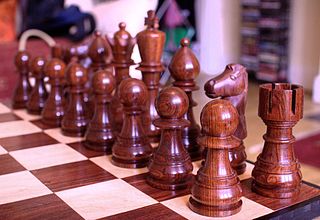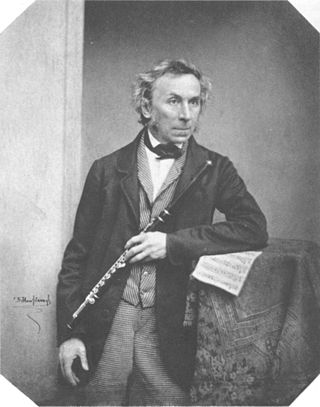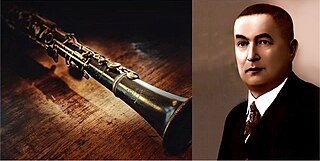The clarinet is a single-reed musical instrument in the woodwind family, with a nearly cylindrical bore and a flared bell.

The oboe is a type of double-reed woodwind instrument. Oboes are usually made of wood, but may also be made of synthetic materials, such as plastic, resin, or hybrid composites.

Cocobolo is a tropical hardwood of Central American trees belonging to the genus Dalbergia. Only the heartwood of cocobolo is used; it is usually orange or reddish-brown, often with darker irregular traces weaving through the wood. The heartwood changes color after being cut and can be polished to a lustrous, glassy finish; being quite dense, sometimes having a specific gravity of over 1.0, it will sink in water. The sapwood is a creamy yellow, with a sharp boundary between it and the heartwood.

The bass clarinet is a musical instrument of the clarinet family. Like the more common soprano B♭ clarinet, it is usually pitched in B♭, but it plays notes an octave below the soprano B♭ clarinet. Bass clarinets in other keys, notably C and A, also exist, but are very rare. Bass clarinets regularly perform in orchestras, wind ensembles and concert bands, and occasionally in marching bands, and play an occasional solo role in contemporary music and jazz in particular.

The basset clarinet is member of the clarinet family similar to the usual soprano clarinet but longer and with additional keys to enable playing several additional lower notes. Typically a basset clarinet has keywork going to a low (written) C or B, as opposed to the standard clarinet's E or E♭. The basset clarinet is most commonly a transposing instrument in A, although basset clarinets in C and B♭ and very seldom in G also exist. The similarly named basset horn is also a clarinet with extended lower range, but is in a lower pitch ; the basset horn predates, and undoubtedly inspired, the basset clarinet.

Theobald Böhm was a German inventor and musician, who perfected the modern Western concert flute and improved its fingering system. He was a Bavarian court musician, a virtuoso flautist and a renowned composer.

The Oehler system is a system for clarinet keys developed by Oskar Oehler. Based on the Müller system clarinet, the system adds tone holes to correct intonation and acoustic deficiencies, notably of the alternately-fingered notes B♭ and F. The system has more keys than the Böhm system, up to 27 in the Voll-Oehler system. It also has a narrower bore and a longer, narrower mouthpiece leading to a slightly different sound. It is used mostly in Germany and Austria. Major developments include the patent C♯, low E-F correction, fork-F/B♭ correction and fork B♭ correction. Fingering charts can be found for example in this reference.

Buffet Crampon SAS is a French manufacturer of wind instruments based in Mantes-la-Ville, Yvelines department. The company is the world market leader in the production of clarinets of the Boehm system. Its subsidiary, Buffet Crampon Deutschland GmbH, founded in 2010 and based in Markneukirchen, Vogtland, Sachsen, is the world market leader in the manufacture of brass instruments. To manufacture and sell its products, the BC Group employed around 1000 people worldwide at the beginning of 2021, 470 of them as employees of BC Germany alone. The management of the group has been in the hands of Jérôme Perrod since 2014.
The Boehm system for the clarinet is a system of clarinet keywork, developed between 1839 and 1843 by Hyacinthe Klosé and Auguste Buffet jeune. The name is somewhat deceptive; the system was inspired by Theobald Boehm's system for the flute, but necessarily differs from it, since the clarinet overblows at the twelfth rather than the flute's octave. Boehm himself was not involved in its development.

Sebastian Manz is a German clarinetist.
Wolfgang Meyer was a German clarinetist and professor of clarinet at the Musikhochschule Karlsruhe. He worked internationally as a soloist, in chamber music ensembles, and in jazz, with a repertoire from early music played on historical instruments to world premieres.

The Akademiemodel Wiener oboe, commonly referred to as the Wiener oboe or Viennese oboe, is a type of modern oboe first developed in the 1880s by Josef Hajek. The design of the Wiener oboe retains the essential bore and tonal characteristics of the historical oboe. The Wiener oboe is named after its origins in Vienna and, besides the more common Conservatoire oboe, is the only other type of modern oboe in use today.

The company Herbert Wurlitzer Manufaktur für Holzblasinstrumente GmbH is a German clarinet manufacturer based in Neustadt an der Aisch, Bavaria with a second production site in Markneukirchen, Saxony. It was founded in 1959 by Herbert Wurlitzer. His father Fritz Wurlitzer operated since the 1930s in Erlbach, now a district of Markneukirchen, a manufactory for the production of clarinets. The company W. Wurlitzer makes clarinets with German System and with the "Reform Boehm system", developed by Fritz Wurlitzer in the late 1940s, an instrument with Boehm fingering system and the sound of an Oehler Clarinet.

The Reform Boehm system is a fingering system for the clarinet based on the Boehm system. It was developed to produce clarinets with the Boehm keywork but with a sound similar to a German clarinet.

Leitner & Kraus is a German clarinet manufacturer based in Neustadt an der Aisch, Bavaria.

Seggelke Klarinetten, is a German clarinet manufacturer based in Bamberg in the Bavarian Upper Franconia. The company manufactures clarinets according to the German system and the French system as well as in a combination of both systems, starting from the Boehm system. A specialty of the company is the reproduction of historical clarinets.

Fratelli Patricola is an Italian company producing oboes and clarinets since 1976, based in Castelnuovo Scrivia, province of Alessandria.

The company F. Arthur Uebel GmbH (FAU) is a German manufacturer of clarinets with headquarters in Wiesbaden and production facilities in Markneukirchen (Saxony).

Friedrich Arthur Uebel was a German woodwind instrument maker. He was owner of the clarinet manufacture F. Arthur Uebel.
Fritz Ulrich Wurlitzer was a German clarinet maker, based in Erlbach in Vogtland, Saxony. He developed the Reform Boehm clarinet and made improvements to the Schmidt-Kolbe clarinet and the German bass clarinet.


















